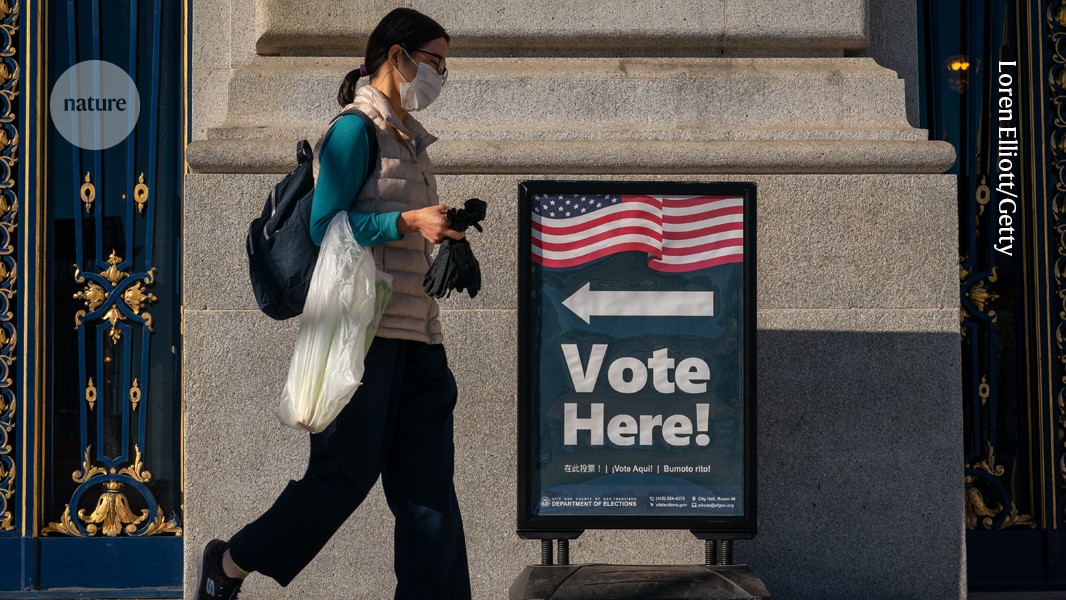Trump’s US election win: researchers must stay strong and united

Despite many seeing the result as a step backwards, the research community should engage with the new administration with courage, tenacity, strength and unity

Moving on: Donald Trump’s re-election poses challenges for science.Credit: Loren Elliott/Getty
When Donald Trump was first elected to the US presidency in 2016, Nature advised scientists to constructively engage with Trump. We said that the incoming president’s contrary approach to evidence, among other things, had no place in modern society. We added that the science community had a responsibility to step up and work with the president and his new administration so that they govern on the basis of research and evidence.
And yet, during Trump’s first term, the world saw a government that ignored and undermined efforts to address some of the world’s greatest problems, such as climate change and a global pandemic. Many researchers left US federal science agencies, their place sometimes taken by lobbyists and political appointees.
The United States has now re-elected Donald Trump as president. Many researchers have told Nature that they are in despair, seeing the election result as a step backwards for facts, reason, knowledge and civility.
Last week, Nature said that the United States needs a leader who respects evidence. The incoming administration must embody this principle. On behalf of the research community, we will hold it to account if it falls short.
We hope that the incoming administration will govern in the best interests of the United States. That means holding on to the best of what the previous administration did, and not returning to some of the policies of the first Trump presidency.
This includes respecting the scientific consensus when making regulatory decisions in public health, environmental issues, artificial intelligence and elsewhere. This is one of the cornerstones of modern government. Policymakers and politicians retain control over decision-making, but they cannot control the facts.
Climate change must also remain a crucial priority. During the past four years, the United States took important steps in recognizing that it is in its own interests to not stand still as global temperatures continue to increase. It enacted policies to support industries and communities through the coming sustainability transition. If those policies are repealed, people on the lowest incomes and those from marginalized communities will be among those most affected.
Both the United States and the world are at their best when the country engages internationally. That means not repeating the previous Trump administration’s decision to exit the 2015 Paris climate agreement — an accord aimed at protecting the world from the impacts of climate change, which US scientists helped to craft. And it means continuing to support other important international organizations, such as the World Health Organization and the United Nations science and cultural organization UNESCO.
Trump’s threat to defund the WHO in 2020 was especially dangerous for those low-income countries where the agency’s work is crucial for tackling diseases and maintaining standards of public-health infrastructure. Currently, the WHO’s epidemiologists, clinicians and logistics personnel are helping to treat and control diseases in countries including Afghanistan, Ukraine, Sudan and Yemen. Diseases do not respect borders: to cooperate and engage with international institutions to fight their spread is in the best interests of the United States.
The United States is a nation that welcomes the world’s talent, in science and in other fields. That must continue if the country wants to maintain its strength in research and innovation, the bedrock of prosperity.
The research community must engage with the new administration with courage, tenacity, strength and unity. At the same time, scientists in the United States must know that they are not alone. The research community is a global one. We need to stand together and stand strong for the challenges that are to come. And that will mean continuing to speak facts to power.
doi: https://doi.org/10.1038/d41586-024-03648-z
This story originally appeared on: Nature - Author:furtherReadingSection


















